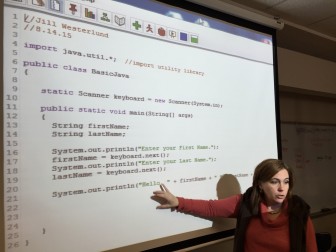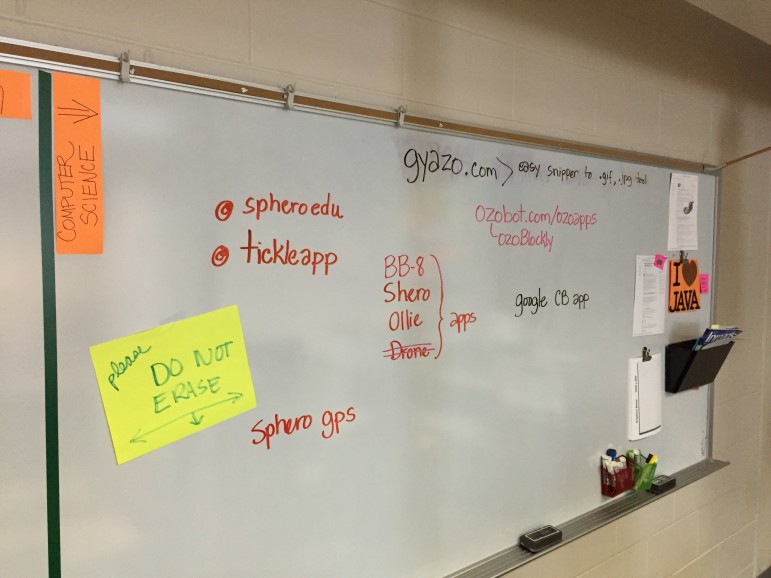Priming the Pipeline for STEM in the South: Student Incentives in Alabama
Given thousands of related job openings but only hundreds of computer science college graduates, Alabama is trying to ramp up its computer science education. That includes a new policy allowing those classes to count toward core math graduation requirements. WBHM’s Dan Carsen concludes the Southern Education Desk series “Priming the Pipeline for STEM in the South” with a visit to a Birmingham-area class that’s leading the way. Listen above or read below.
Hoover High School junior Griffin Davis is all about his computer science class.
“Honestly, this is probably my favorite part of the day,” he says, “because I get to come in here and I get to be on the cutting edge of things. I get to be … what’s next.”
He’s engineered 3-D-printed parts that’ll help drones drop probes into the Cahaba River, and he’s helped teach programming to grade-schoolers. That’s the type of interest this new class is meant to spark. It’s a more accessible version of an Advanced Placement computer science course — sort of like a science class for non-science majors. It’s meant to be less intimidating than the older, more specialized standard AP course and attract kids from all backgrounds.
Jill Westerlund teaches both classes — about 40 students altogether. She also writes a computer-science education blog.
“I would love it if every student had a course that incorporated some concepts of technology, whether they’re thinking about innovation, global impact, ethical issues,” she says. “And there’s no way that computer science isn’t a part of everything, whether you’re a mechanic, whether you’re an engineer, whether you’re an accountant.”
The national nonprofit code.org wants to smooth that pathway from class to career. It’s teaming up with educators — not to mention providing funding — to boost the number of computer science teachers in the state from 50 to 100 by next school year.
This year, “comp sci” classes can count toward math graduation requirements.
“That definitely makes sense,” says Davis. “Programming is a whole bunch of data. And you just have to interpret it and then make it easy to use.”
On coding possibly counting as a foreign language in Florida, Davis says, “It definitely is [a foreign language]. The reason I really enjoy programming is … I picked up Spanish really easily; language came easily to me. And I like building things too. I’ve wanted to be an engineer since I was born, basically. So, what programming allows me to do is put those two things together.”
And he says of computer science what foreign-language experts say about their field: “Start it earlier. In elementary school.”
After more than two decades of teaching, Jill Westerlund agrees. As for allowing computer science classes to count toward math graduation requirements, she sees pros and cons.
“A student would be able to take more credits toward their goal in college or the workforce,” she says. “The con, if they’re going to go on to college: do you really want to miss a year of drill-down math on daily basis? Computer science is built on math, but it’s not the same as math homework and math problems every single day.”
But she also thinks the pairing could ultimately increase funding for computer science classes and access for kids across Alabama. The results remain to be seen because the policy and the partnership are so new. What seems certain now, though, is that more kids are getting fired up and engaged in computer science and possibly becoming very employable in the process.
The Southern Education Desk is supported by a grant from the Corporation for Public Broadcasting. You can access the series and learn more at southerneddesk.org.
A New Orleans garden paid hundreds of dollars in fees for a sewer that doesn’t exist
Galvez Garden owner Lissie Stewart has been fighting the New Orleans Sewerage and Water Board over inaccurate billing for years.
Alabama coal mine keeps digging after hundreds of fines and a fatal explosion
Following the death of a grandfather, Crimson Oak Grove Resources has left a community afraid for their homes and lives. An expert warns one resident may need to evacuate her home while she still can.
Florida’s 6-week abortion ban will have a ‘snowball effect’ on residents across the South
Abortion rights advocates say the ban will likely force many to travel farther for abortion care and endure pregnancy and childbirth against their will.
Attitudes among Alabama lawmakers softening on Medicaid expansion
Alabama is one of ten states which has not expanded Medicaid. Republican leaders have pushed back against the idea for years.
Birmingham is 3rd worst in the Southeast for ozone pollution, new report says
The American Lung Association's "State of the Air" report shows some metro areas in the Gulf States continue to have poor air quality.
Why haven’t Kansas and Alabama — among other holdouts — expanded access to Medicaid?
Only 10 states have not joined the federal program that expands Medicaid to people who are still in the "coverage gap" for health care









